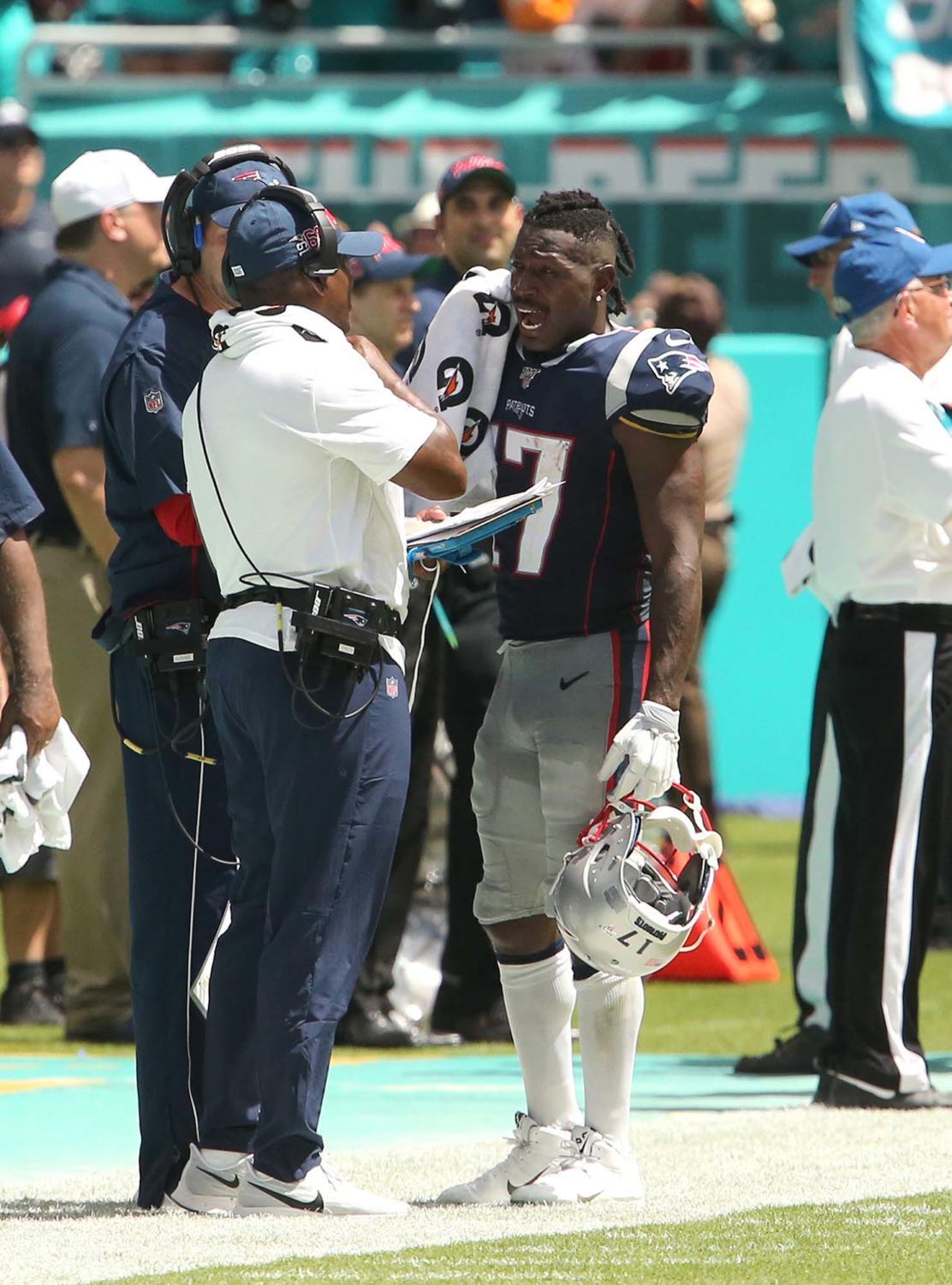Editorial: Antonio Brown should be benched


New England Patriots wide receiver Antonio Brown (17) talks with coaches during the second quarter against the Miami Dolphins on Sunday, Sept. 15, at Hard Rock Stadium in Miami Gardens, Florida.
Antonio Brown made his debut with the New England Patriots Sunday, but there was debate on whether or not he should be allowed on the field.
The former Steelers wide receiver was accused of rape and sexual assault in a civil lawsuit filed in the Southern district of Florida on Tuesday. The lawsuit, which was filed by Brown’s former trainer, Britney Taylor, gave a detailed and brutal account of what Brown allegedly did to Taylor. The accusations led many to wonder whether or not Brown would play in his first game for the Patriots. He did — but he definitely should have been benched.
Brown and Taylor, a former gymnast, met in 2010 at a Bible study group at Central Michigan University. Brown allegedly reached out to her via social media in 2013 to ask for revealing photos of Taylor and remained in contact with her over the years. He asked Taylor to help him improve his flexibility in 2017. Taylor said Brown sexually assaulted her twice in June 2017 and raped her in May 2018. Brown denies the accusations.
“Mr. Brown denies each and every allegation in the lawsuit,” said a statement from Brown’s attorney. “He will pursue all other legal remedies to not only clear his name but to also protect other professional athletes against false accusations.”
The statement goes on to frame Taylor’s accusations as motivated by a desire for fame and money, which is a problematic way to treat accusations of sexual assault. The decision for a survivor to come forward with his or her traumatic experiences is not easily made, especially against well-known figures like Brown. To treat these serious allegations as a grab for fame is insulting to Taylor and the traumatic experiences she allegedly faced.
Following an incident of domestic violence involving Baltimore Ravens running back Ray Rice in 2014, the NFL adopted a stricter policy for off-the-field violence. The new policy requires an independent investigation, separate from law enforcement, in abuse cases. The league says it will do so in Brown’s case.
“We take these allegations very seriously,” said a statement from the Patriots. “Under no circumstances does this organization condone sexual violence or assault. The league has informed us that they will be investigating. We will have no further comment while that investigation takes place.”
However, by allowing Brown to play yesterday, the Patriots and the league are in a way making a comment on the situation. They’re sending the message that they don’t take alleged survivors of sexual assault seriously. This is especially concerning because the assault happened at Brown’s place of work with someone else who worked for the NFL. They’re allowing an “employee” to continue working when he’s shown concerning and dangerous behavior towards fellow employees.
NFL Commissioner Roger Goodell could place Brown on the commissioner’s exempt list, which is paid leave for players charged with crimes or who have violated the personal conduct policy. Brown hasn’t been accused of a crime officially yet, but the exempt list is a way of taking Brown out of the game and the limelight while the NFL and other groups investigate Taylor’s claims.
Regardless of what the results of the investigations are, keeping Brown in the game is insensitive and suggests the NFL and the Patriots are willing to overlook cases of abuse and violence in order to keep their players on the field. It isn’t a good look for Brown, the team, the league or the game.
Recent Posts
Opinion | Duolingo: A beacon of hope or an agent of evil?
Duo was brutally plowed down by a shiny, ugly Tesla Cybertruck. By extension, Elon Musk…
Marcello Hernández fans fill WPU Assembly Room, and then some
On Monday night, comedian Marcello Hernández “came all this way” to Pitt, delivering a set…
97th Academy Awards post-mortem: Should we replace the Academy voters with a poll on Letterboxd?
While blockbusters like “Dune: Part Two” and cultural phenomena like “Challengers” dominated at the box…
Five years later: COVID-19 and quarantine’s lasting legacy in national and local health care industries
At the fifth anniversary of the COVID-19 pandemic, UPMC and Pitt Student Health Services reveal…
Column | DK Metcalf trade is reputation-defining for Steelers’ front office
At a turning point in the franchise, Pittsburgh Steelers fans were enthused when Omar Khan…
‘H2PinskyBudike’ ticket wins 2025 SGB election
Student Government Board announced election results for president, vice president, and board member positions and…